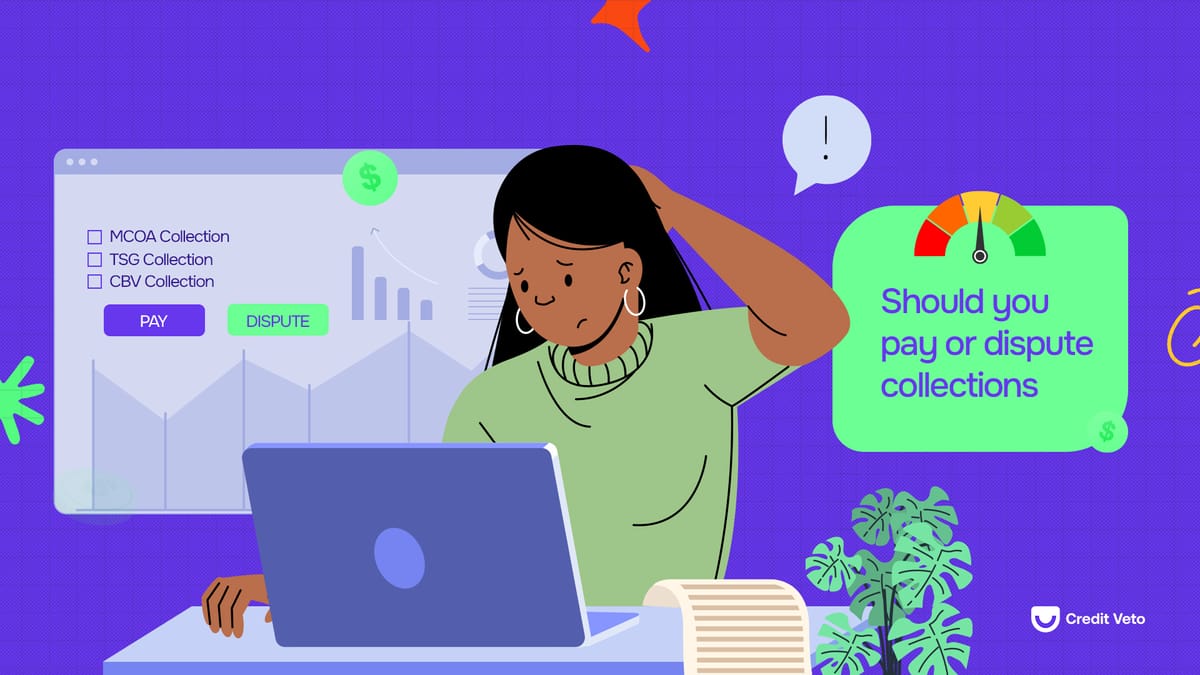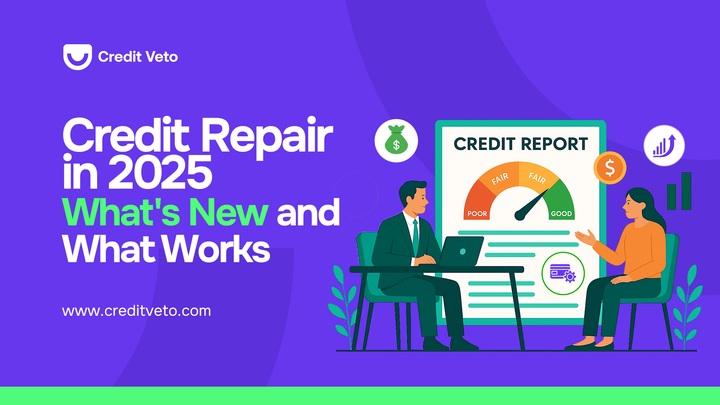Should You Pay a Collection or Dispute It?
Facing a collection on your credit report and wondering whether to pay it or dispute it? Discover your best option, and learn how to handle collections from agencies like MCOA, TSG, and CBV. Get expert insights on improving your credit today!

When it comes to managing your credit, one of the most common issues you’ll face is dealing with collections. Whether it’s an MCOA collection, legal collections, or a more generic entry like FRS collections, these negative marks on your credit report can be incredibly damaging to your financial health. But when you find yourself facing a collection, the big question arises: Should you pay a collection or dispute it?
This post will dive deep into the pros and cons of paying vs. disputing a collection, answer some common questions about the process, and discuss the various types of collections such as CBV collections, Aldi and Associates lawsuits, and others.
By the end of this blog, you’ll know exactly how to approach collections on your credit report and which path will benefit your credit score the most.
Understanding Collections and Their Impact on Your Credit Score
Collections can be a nightmare for anyone trying to maintain or improve their credit score. When a debt goes unpaid for a long period, creditors may pass it along to a collection agency. These collection accounts can stay on your credit report for years, making it harder to secure loans, rent apartments, or even get a job in some cases.
But here’s the good news: You have options when dealing with collections. The two main choices are paying off the debt or disputing the collection. Each option comes with its benefits and drawbacks, and understanding which path is best for your financial situation is key.
Let’s break it down.
How Do Collections Affect Your Credit?

Before we explore whether to pay or dispute a collection, it’s important to understand how collections impact your credit score. Collections are reported to credit bureaus, and they significantly damage your score by affecting the payment history portion of your credit report, which makes up about 35% of your score.
A collection account is essentially a red flag for potential lenders, as it signifies that you have failed to pay a debt on time, which significantly impacts your creditworthiness.
When a collection account is reported to the credit bureaus, it becomes part of your credit report and can stay there for up to seven years. A late payment or missed payment can cause a significant drop in your score, and when the account is handed over to collections, it typically signals a more severe financial issue.
The longer a collection remains on your credit report, the more it can affect your credit score. During this period, lenders or creditors may view you as a higher-risk borrower, which could result in higher interest rates or loan denials. Even after you’ve paid off a collection, the account can still negatively affect your credit score as it remains listed on your credit report, often preventing you from qualifying for favorable loan terms.
In short, collections can cause a severe, long-term impact on your credit score and ability to obtain credit, which is why it’s important to understand how they work and how best to manage them, whether through payment, dispute, or removal.
Types of Collections
Understanding the different types of collections can help you better navigate how to handle them. Here are some of the most common collection agencies and their roles in the credit repair process:
- MCOA Collection (Midland Credit Management): This agency is one of the most commonly reported debt collectors. When you see MCOA on your credit report, it means Midland Credit Management has purchased your debt from the original creditor and is now responsible for collecting it.
- Legal Collections: These collections are associated with debts that have been taken to court. This can include anything from medical bills to credit card debt. Legal collections typically mean a creditor is seeking legal action to recover the debt, which can result in judgments that negatively impact your credit.
- TSG Collections (The Source Group): TSG is another debt collection agency that specializes in recovering overdue payments. If TSG appears on your credit report, it indicates that they are trying to collect money you owe.
- CBV Collections: CBV Collections is an agency that handles overdue debts, often for businesses that want to recover money from customers who have defaulted on payments.
- Aldi and Associates Lawsuits: If Aldi is pursuing you for unpaid debt, they may file lawsuits against you. These lawsuits can have serious consequences on your credit report. If you’re facing legal action, it’s recommended to consult an attorney or a professional credit repair company like Credit Veto for guidance.
- Hunter and Warfield: This agency specialises in reporting delinquent accounts. If they’ve been assigned to collect your debt, their reporting can severely hurt your credit score. It’s important to address their collection efforts promptly to prevent long-term damage to your credit.
Each of these collection types can have a significant impact on your credit, so understanding their role is vital when deciding whether to pay or dispute these accounts.
Should You Pay a Collection or Dispute It?
Now that we understand the impact of collections on your credit score, let’s look at your options: paying or disputing the debt.
Option 1: Paying a Collection
Paying a collection account can sometimes improve your credit score in the short term, but it’s not always a guaranteed fix. When you pay off a collection, it will show as paid or settled on your credit report, which might help improve your score over time. However, the negative mark for the collection itself may still remain for up to seven years from the date of the original delinquency, impacting your score.
- Pros of Paying Collections
- Settles the debt: Once you pay the debt, you no longer owe the creditor or collection agency.
- Shows responsibility: Paying the debt off demonstrates to potential lenders that you’re responsible, even if the account remains on your credit report.
- Potential for removal: If you can negotiate with the collection agency, you might be able to have the collection removed from your credit report once it’s paid.
- Cons of Paying Collections
- The collection may remain on your credit report: Even after you pay, the collection could stay on your report for up to seven years.
- It might not improve your score immediately: Your score may not jump dramatically after paying the debt off, as the collection may still be impacting your score until it falls off your report.
Option 2: Disputing the Collection
Disputing a collection means challenging the accuracy of the debt and having the credit bureaus investigate whether the collection is valid. If the collection agency fails to verify the debt within a certain timeframe, it must be removed from your credit report.
Disputing a collection is a great option if you believe the collection is a mistake, if the debt is too old, or if the collection agency cannot provide evidence that the debt is valid. In fact, collections like CBV collections and MCOA collections are sometimes marked incorrectly, which is why disputing them can be effective.
- Pros of Disputing Collections
- Potential to remove the collection: If the collection agency cannot validate the debt, it will be removed from your credit report.
- No payment necessary: You don’t have to pay the collection, which can be a relief if you are unable to afford the full amount.
- Faster credit score improvement: Disputing a collection and having it removed can improve your credit score more quickly than paying off the debt.
- Cons of Disputing Collections
- No guarantee: Disputing does not always lead to the removal of the collection. If the collection agency can validate the debt, it will remain on your report.
- Takes time: The dispute process can take up to 30 days or longer. In the meantime, your credit report will still show the collection.
- Could lead to further legal action: If the debt is legitimate, you could face legal consequences or wage garnishment in the future.
How Long Does It Take to Dispute a Collection?
Disputing a collection isn’t a fast process. Typically, the credit bureaus are required to investigate the dispute and respond within 30 days. If the collection agency does not respond to the dispute within this period, the collection must be removed from your credit report.
However, some collections may take longer to resolve, depending on the complexity of the dispute and the resources needed to verify the debt.
How to Dispute an Apartment Collection
Many people struggle with apartment collections, especially if the debt is related to unpaid rent, damages, or lease violations. Whether it involves a mortgage or renting an apartment, when disputing apartment collections, it’s crucial to:
- Obtain all documentation: Request a copy of the lease agreement and any evidence that the debt is valid.
- Dispute inaccurate charges: If the collection agency is reporting incorrect amounts or dates, you can dispute the accuracy with the credit bureaus.
- Negotiate with the collection agency: Sometimes, collection agencies will accept a settlement or agree to remove the collection once it’s paid.
Key Factors to Consider Before Paying or Disputing a Collection

When deciding whether to pay or dispute a collection, consider these factors:
- The age of the debt: If the debt is very old, it may not have much impact on your score anymore. In this case, disputing the debt might be more beneficial.
- Your financial situation: If you’re struggling to make ends meet, disputing the collection might be the best option.
TSG - The collection agency: Some agencies are more willing to negotiate than others. Agencies like TSG Collections or PDM Collections might be more flexible.
Bottom Line: Pay or Dispute? What’s the Right Choice for You?
Deciding whether to pay or dispute a collection can feel overwhelming. Ultimately, it comes down to the validity of the debt, your financial situation, and your long-term goals.
If you think the collection is inaccurate or outdated, disputing it may be the fastest route to improving your credit score. However, if the debt is valid and you can afford to pay, settling the debt can help reduce the damage to your credit report.
If you need help navigating collections or understanding the best steps for your credit, consider getting professional help from Credit Veto by starting our 7-day free trial.
Also, you should enrol in a credit repair program like Credit Veto’s 5x5 Challenge. This challenge offers a proven approach to managing collections, improving your credit, and gaining financial freedom.
Frequently Asked Questions (FAQs)
Q: How long does it take to dispute a collection?
A: Disputing a collection typically takes about 30 days. If the collection agency cannot verify the debt within that time, the collection will be removed from your report.
Q: Should I dispute ownership or accuracy?
A: It’s better to dispute accuracy first. If you don’t recognize the debt or believe the amount is wrong, start there.
Q: What if the collection is from Aldi and Associates?
A: If Aldi and Associates have reported a collection, ensure they provide accurate documentation to verify the debt. If they can’t, you can dispute it.
Sign up for the 5x5 Credit Veto Challenge today and get expert guidance on repairing your credit!




Comments ()